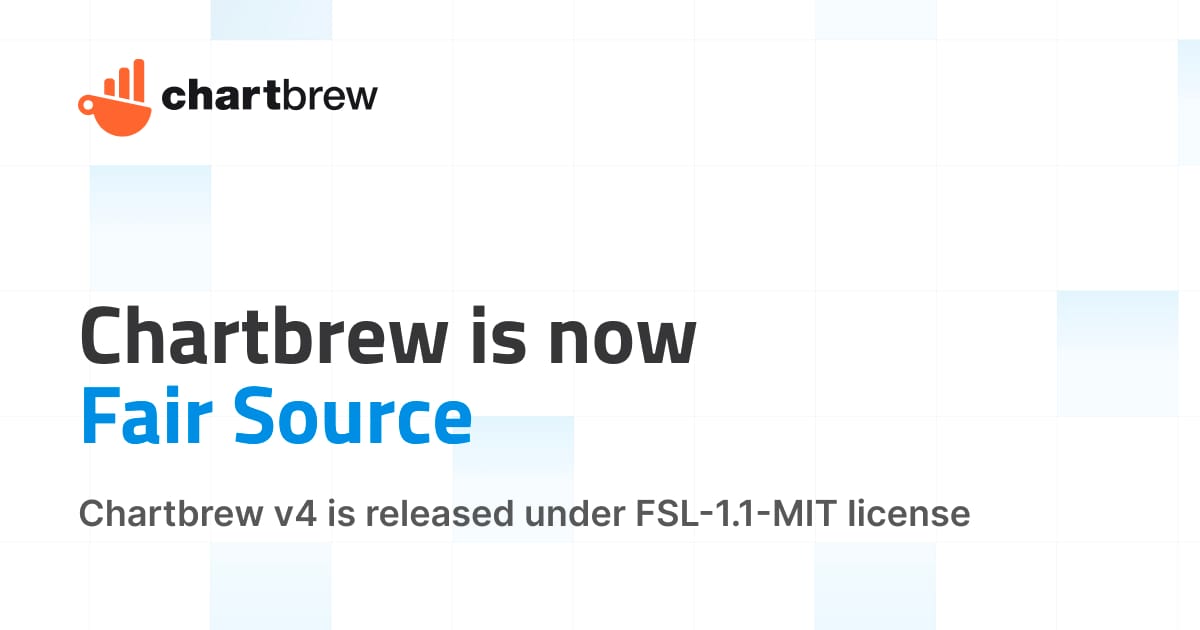Chartbrew is now Fair Source
Chartbrew v4 uses the FSL license. Learn what’s allowed, what’s changed, and how it helps keep the project sustainable while staying open for most users.

Starting with version 4, Chartbrew is moving to a new licensing model based on the Fair Source license. This change is designed to support the long-term sustainability of the project while keeping it open and accessible for nearly all users.
Why the license change
Chartbrew has come a long way since it first launched. What started as a small open-source side project has grown into a platform used by startups, agencies, educators, and developers across the world. It's become the core product of my independent business, and I'm still building and supporting it as a solo founder—every new feature, support reply, and release comes from me.
But with this growth also came new pressures. Some companies started repackaging and reselling Chartbrew without contributing back, while the time and infrastructure demands continued to grow. To protect the project’s future and continue investing in its improvement, I’m introducing a new licensing model starting with version 4.
This change allows Chartbrew to remain accessible and open to nearly everyone while preventing direct commercial competition that undermines the work behind the project. Excited to join the ranks of other software companies that adopted the Fair Source license.
What does this change mean for Chartbrew users?
Starting with version 4, Chartbrew is licensed under the Functional Source License 1.1 (FSL-1.1-MIT). Versions before v4 will remain under the permissive MIT license.
To see what this means in legal terms, please read the license. But here's the practical summary:
You can continue to use, modify, and deploy Chartbrew for nearly any purpose—including internal company use and client work—without needing to pay or ask for permission. However, you cannot directly compete with Chartbrew by reselling it as a hosted product or rebranding it into a commercial service.
This licensing approach ensures we can keep investing in Chartbrew’s growth while still giving our users the freedoms they expect from open-source software.
✅ What you CAN do with Chartbrew under FSL:
- Run Chartbrew internally or for client reporting dashboards
- Modify the source code for private or open-source use
- Build custom features, connect to private systems, or integrate with your stack
- Share changes with the community or keep them in-house
- Use Chartbrew in your SaaS product as long as Chartbrew itself isn’t the paid-for feature
❌ What you CANNOT do under FSL:
- Rebrand Chartbrew and sell it as a competing product
- Offer Chartbrew as a hosted service (SaaS) without a commercial license
Need Commercial Licensing?
If you’re a company that:
- Wants to offer hosted dashboards as a service
- Needs white-labeling and advanced embedding
- Requires SLAs and direct support
We provide commercial licensing with flexible, fair terms. Just get in touch.
MIT license still applies to v3 and earlier
If you're using Chartbrew version 3 or older, you remain covered by the original MIT license. Those versions will remain fully open-source and unrestricted.
Time-based re-licensing
To keep the project open in the long term, each version of Chartbrew licensed under FSL will automatically convert to MIT two years after its release. This ensures the community never gets locked out and can always access a fully open version of the project over time.
Why this matters
Licensing is a tricky but necessary part of maintaining an open project. We believe the FSL strikes the right balance: it prevents direct competition while letting most users continue to use, improve, and share Chartbrew freely.
We’re committed to transparency and open communication. If you’re unsure whether your use case requires a commercial license, just ask.
Questions or feedback? Join the Discord or email us at [email protected].
Raz, Founder @ Chartbrew
